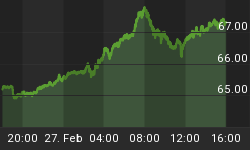Mohamed El-Erian, chief executive officer and co-chief investment officer at PIMCO, spoke about the February U.S. jobs report and the European debt crisis on Bloomberg Television this morning. El-Erian said the economy is "muddling through" and that "one-off factors" have contributed to a recent stock market rally.
On today's jobs report:
"It's good number - not just the headline but also the revisions. Also, the fact that the participation rate is going up and some of the structural elements are improving...Overall, a good report. Having said that, it's just indicative of the healing process. We are not yet at escape velocity. We're not yet in a place where the labor market and consumers can push this economy forward."
On reaching the escape velocity point:
"I wish we were, Betty, but I don't think so. In Europe, we haven't really solved anything. Greece still has too much debt. Nothing has been done to improve the growth rate of European economies. So, in European, all we've done is push back the problem as little but we haven't solved it."
"We have the geopolitical headwinds out there and then when we look at our own economy, we haven't done enough on the structural side and we now have the prospects that the fiscal side is going to be contractionary. Unfortunately, the best we can do right now is just muddle along. We're not yet at escape velocity."
On the jobs being added to the payroll being so low pay:
"First, hourly earnings were 0.1. We need to see hourly earnings increasing a lot more. That speaks to what you just said, which is we're creating only low-pay jobs. Yes, oil is a headwind. We must not forget that it's a significant part of consumption. Unfortunately, we're going to be at high oil prices because of all of the geopolitical concerns."
"That's why it goes back to, when you look at different components of demand, it's difficult to identify the one that will cause this breakout. It's not going to be the rest of the world. They're slowing. It's not going to be the government. It's not going to be the consumer. Could it be business? Yes. But business has to have better assurances that demand will ultimately go up, otherwise they do not invest."
On whether stocks will rally even if the economy is "muddling through":
"Correct. We're looking at a growth rate just under 2% for the U.S. Within that, you will see a lot of differentiation. The key issues for PIMCO as an equity managers and others is to be able to choose the different sectors and companies. What are you looking for? You're looking for strong balance sheet. You're looking for an ability to put money back to the shareholder. You're looking for exposure to high growth. There are companies out there and our analysts and portfolio managers work very hard to identify them. Yes, you're going to get some companies doing really well and differentiation is going to be key."
On whether we've averted a disaster in Europe:
"Not yet. In Greece, what we've done is, we've reduced the debt stock somewhat, but even at 120% of GDP, by 2020, if everything goes well, which is a big assumption, that's still too high. That is why the market immediately price in a second PSI, or a second debt reduction operation, down the road."
"We haven't solved Greece, yet. Greece will come back. We have Portugal, which has sovereign concerns. We've made progress and particularly, we have made progress for the LTRO. We haven't fundamentally solve the problem of too little growth and too much debt."
On the difference between Greece, Portugal and Italy and Spain:
"We exited Portugal a long time ago, two plus years ago. We've been watching, and the reason why we exited Portugal and the reason why we exited Greece a long time ago is because we are worried about the sovereignty issues. We're not involved in Portugal or Greece. We're watching it and we still think both of them have not been solved. Spain and Italy are fundamentally different. They don't have the sovereignty issues that Greece and Portugal have, and they also have an ability to turn the corner and they have much more support from the European community I would draw a line between Greece and Portugal and Italy and Spain."
On the stock market rally:
"I think we've benefited enormously in the markets from liquidity. Not just the ECB and the Fed, but the Swiss National Bank, the Bank of Japan, India, Brazil, everybody is easing monetary policy. We've had a rush of liquidity come in and that has helped the markets. Plus, we've had one-off factors. Do not forget the fall in the U.S. savings rate that has helped us. So, this rally is warranted. It is warranted by these temporary factors, but we now need to hand off to more permanent factors."















